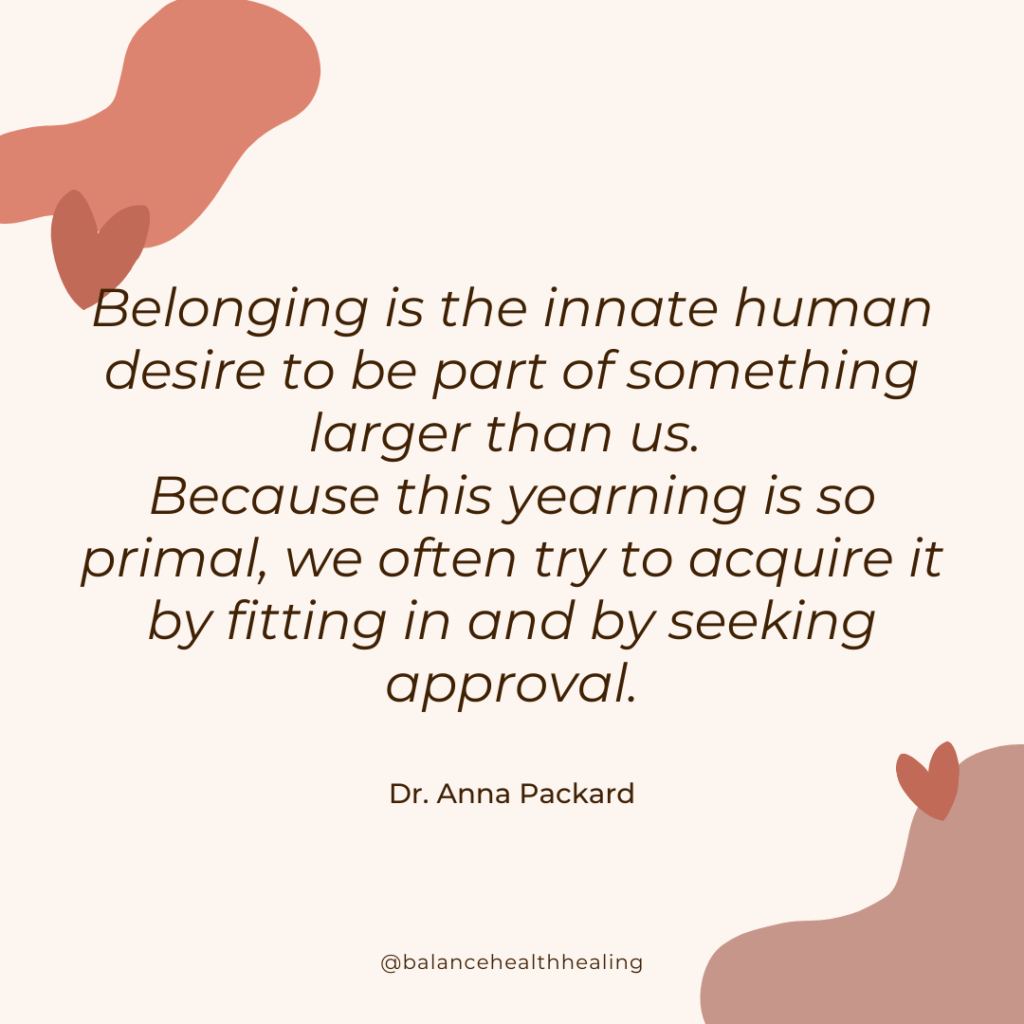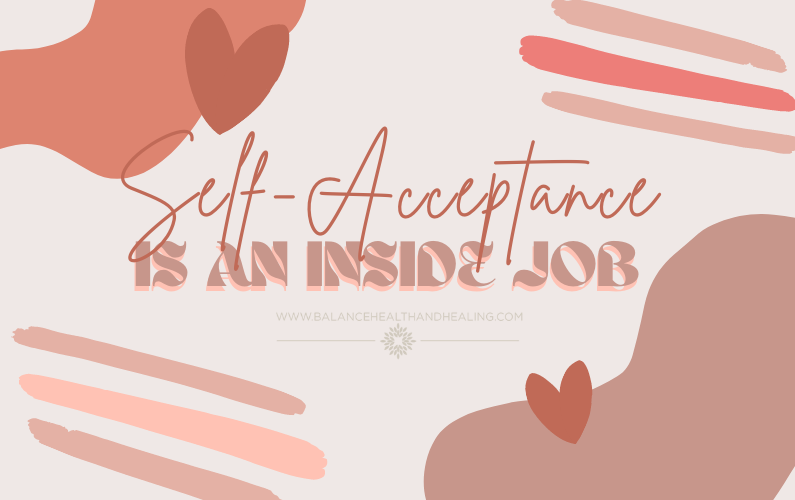Eating disorders are inauthentic. To have an eating disorder requires showing up in the world inauthentically.
Eating disorders operate on a false formula for safety, belonging and love. Eating disorders take messages from the world about conformity and belonging and say, “I’ll raise you one more” and do it even “better.”
 To quote the authority on the topic of authenticity and belonging, Dr. Brené Brown says, “Belonging is the innate human desire to be part of something larger than us. Because this yearning is so primal, we often try to acquire it by fitting in and by seeking approval, which are not only hollow substitutes for belonging, but often barriers to it. Because true belonging only happens when we present our authentic, imperfect selves to the world, our sense of belonging can never be greater than our level of self-acceptance.” (Braving the wilderness p.31-32).
To quote the authority on the topic of authenticity and belonging, Dr. Brené Brown says, “Belonging is the innate human desire to be part of something larger than us. Because this yearning is so primal, we often try to acquire it by fitting in and by seeking approval, which are not only hollow substitutes for belonging, but often barriers to it. Because true belonging only happens when we present our authentic, imperfect selves to the world, our sense of belonging can never be greater than our level of self-acceptance.” (Braving the wilderness p.31-32).
This quote is loaded so let’s explore it part by part and how it relates to eating disorders.
“Belonging is the innate human desire to be part of something larger than us. Because this yearning is so primal, we often try to acquire it by fitting in and by seeking approval…”
We can have compassion for ourselves and how we each learned to believe that acceptance and belonging are synonyms with approval. Often this comes from experiences with rejection. I know the pain my clients unravel under is the belief that their history of rejection equates to truth about themselves. They believe something is wrong with them. They believe their authentic selves are unacceptable to humanity and must therefore be controlled and shrunken and shaped into acceptable and small versions. An eating disorder is both a chronic attempt to move toward love and belonging and also hide away from the vulnerability that is required for that very love and belonging.
This leads to the next point, “which are not only hollow substitutes for belonging, but often barriers to it.”
So first, eating disorders are ubiquitously characterized by striving– to varying degrees of success– to fit into the “ideal” of beauty. In our society, that “ideal” is unrealistic and unhealthy. However, even if you achieve that bodily ideal, your sense of belonging is based on something external, which isn’t authentic. You are literally only granting others access to a controlled version of you that is “skin deep.”
This outward conformity bleeds into an attempt for internal conformity as well. The body is merely a symptom of a whole systemic process. You are not only trying to be outwardly acceptable in your body, but also acceptable in every other way. This is why “people pleasing” is such a chronic curse that accompanies eating disorders. When you are so focused on what you think others want you to be, you cannot get in touch with who you really are. You see parts of yourself as threatening and scary if they fall outside perceived accepted norms.
Further, eating disorders hijack brains and personalities. Eating disorders consume valuable mental energy and reduce the richness that is you into obsessive thoughts about food and body size. All the other parts of you that are worthy of belonging either don’t show up at all, or show up in shadows and whispers.
So, you cannot find belonging when you are chronically faking it. Which is exactly what eating disorders require.
“Because true belonging only happens when we present our authentic, imperfect selves to the world…”
Perfectionism is another “associated feature” of eating disorders. Perfectionism is characterized by reducing vulnerability through chronic attempts to “be perfect” or “do perfectly.” Again, it is the misplaced striving for love and acceptance through presenting a perfected version of ourselves to the world.
I love how Brené Brown pairs authentic and imperfect together. This resonates deeply as truth to me. I’m not going to advocate that this is simple to do in practice, but knowing its truth and value motivates me toward my own willingness to be messy and human.
Because I am messy. I don’t have it all figured out. I know the discomfort of fear and vulnerability. I know the pain of rejection. I am familiar with the darkness in mental illness. I too have parts of my personality that I don’t like and wish were different. I know I am quirky, and for some people, an “acquired taste.”
And there came a point in my life that the cost and energy required in conformity was too heavy and too much. I got tired of inauthentic living. Living inauthentically is painful and lonely.
was too heavy and too much. I got tired of inauthentic living. Living inauthentically is painful and lonely.
So I decided to show up in more messy and honest ways. I am not going to pretend I do this well all the time. It’s a work in progress. But in that progress, I have felt more seen and it is here that I have found “my people.”
“…our sense of belonging can never be greater than our level of self-acceptance.”
Please read that again. And again. And again.
We will never find true belonging in approval from others. In our hearts, we all know this. But the invitation to step into our deepest selves is the epitome of vulnerability. To step into witnessing, honoring, and accepting who we are, with compassion and love. Wow, that would be powerful. That would be brave.
And then to let ourselves expand into our full version of who we are and show up in the world that way. Wow. Now that is honest, courageous, and brave living.
To quote Brené Brown again, “Once we belong thoroughly to ourselves and believe thoroughly in ourselves, true belonging is ours.”
I wish I could hold a mirror for my clients when they show up in their authentic, vulnerable, imperfect selves. The love I feel for them is immediate and deep. I wish they could know how inherently loveable and likeable they are as themselves.
But self-acceptance is an inside job.
I hope for a world where we can all loudly and ceremoniously reject the false formulas for acceptance and belonging, and step into our power: authenticity, imperfection, and self-acceptance.
This is my hope for all of us.

